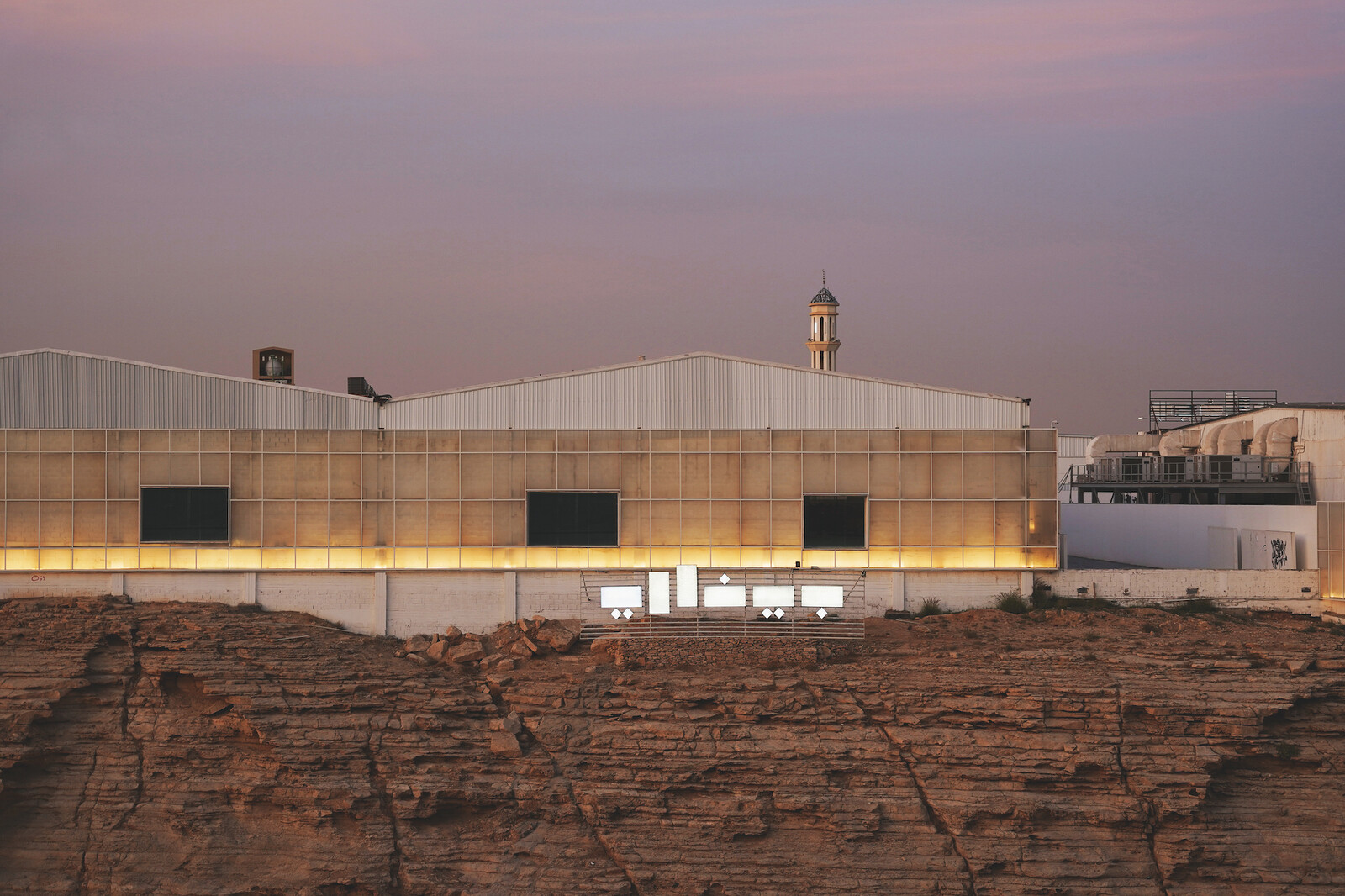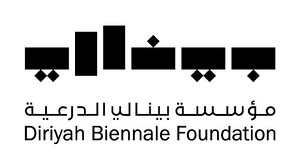Diriyah Contemporary Art Biennale 2024
February 20–May 24, 2024
JAX District
Diriyah
Saudi Arabia
The second edition of the Diriyah Contemporary Art Biennale, titled After Rain, opened to the public on February 20. It runs through May 24, 2024. Organized by the Diriyah Biennale Foundation, After Rain is led by Artistic Director Ute Meta Bauer and takes place in the JAX District, a creative district with industrial heritage in the historic town of Diriyah. Featuring work by artists from Saudi Arabia and around the world, the exhibition explores the role of a contemporary art biennial in a country that is undergoing rapid social change.
After Rain brings together artists of diverse backgrounds who investigate the relationship between humans and nature, examine the built environment, observe and interact with the landscapes that surround us, recount histories, and encourage us to listen more closely. Conceived as a vibrant entity rather than a static framework, the Biennale’s multi-format platforms consist of an exhibition, the Biennale Encounters series of public programs, a film program, performances, research projects, and dialogues.
After Rain features 177 works from 100 artists and artist groups, of which over 30 are from the wider Gulf region. The Diriyah Biennale Foundation supported 47 new commissions from artists including Jumana Emil Abboud, Sara Abdu, Mohammad AlFaraj, Azra Akšamija, Tarek Atoui, Rachaporn Choochuey, Vikram Divecha, Christine Fenzl, Anne Holtrop, Armin Linke & Ahmed Mater, NJOKOBOK (Youssou Diop and Apolonija Šušteršič), and Camille Zakharia. There will also be a welcoming work by Tania Mouraud staged on a roundabout and a long-term project by Mariah Lookman presented at Shamalat, a cultural space at the periphery of old Diriyah.
Many of the artworks included in After Rain share a focus on basic human needs such as water, food, and shelter. The works are rooted in artistic research and informed by the curatorial team’s trips across Saudi Arabia, which resulted in a multigenerational artistic conversation. The Biennale presents a multisensory experience—foregrounding touch, taste, and smell in addition to sight and sound—and invites visitors to become part of an immersive journey.
The exhibition occupies six expansive halls across 12,900 square metres and also extends into adjacent courtyards and terraces, turning these areas into works of art and social spaces. Various shaded gathering places are introduced, including a communal kitchen and a juice bar. A year-long series of artist talks, workshops, and presentations of sound and performance art, titled Biennale Encounters, has been welcoming local audiences since April 2023. A purpose-built black box theater will showcase ten films on rotation, and a special area is dedicated to research-based works and the processes that inform exhibited artworks. The Learning Garden, a digital extension of the Biennale, will continue after the exhibition closes in May.
List of participating artists
Hamra Abbas, Jumana Emil Abboud, Sara Abdu, Irene Agrivina, Alia Ahmad, Azra Akšamija, Nabila Al Bassam, Tara Aldughaither & Joe Namy, Rasha Al-Duwaisan, Mohammad AlFaraj, Dhali Al Mamoon, Reem Al Nasser, Daniah AlSaleh, Abdulrahman Al-Soliman, Aseel AlYaqoub, El Anatsui, Nazgol Ansarinia, Rasheed Araeen, Siah Armajani, Andrius Arutiunian, Martha Atienza, Tarek Atoui, Dana Awartani, Asma Bahmim, bahraini—danish, Sammy Baloji, Zarina Bhimji, Ursula Biemann, Safeya Binzagr, Rossella Biscotti, Bricklab, Britto Arts Trust, Muhanned Cader, María Magdalena Campos-Pons, Cercle d’Art des Travailleurs de Plantation Congolaise, Rachaporn Choochuey, Tiffany Chung, Ade Darmawan, Priyageetha Dia, Vikram Divecha, Ibrahim El-Salahi, Alexander Eriksson Furunes & Sudar Khadka, Alia Farid, Christine Fenzl, Ângela Ferreira, Simryn Gill, Anne Holtrop, Hiba Ismail, Saodat Ismailova, Joan Jonas, Susanne Kriemann, Liang Shaoji, Armin Linke & Ahmed Mater, Liu Chuang, Mariah Lookman, Nidhi Mahajan & Moad Mosbahi, Taus Makhacheva, Robin Meier Wiratunga, The Migrant Ecologies Project, Małgorzata Mirga-Tas, Regina Maria Möller, James Morris, Tania Mouraud, Zarina Muhammad, Dala Nasser, Hind Nasser, Hussein Nassereddine, Filwa Nazer, Nguyễn Trinh Thi, NJOKOBOK, Elia Nurvista, Phi Phi Oanh, Lucy + Jorge Orta, Jorge Otero-Pailos, Sopheap Pich, Marjetica Potrč, Lala Rukh, Arin Rungjang, Tomás Saraceno, Citra Sasmita, Seher Shah, Hassan Sharif, Shooshie Sulaiman, syn architects, Tang Da Wu, Paulo Tavares / autonoma, TAYYŪN, Sissel Tolaas, Anaïs Tondeur, Mona Vătămanu & Florin Tudor, Suzann Victor, Munem Wasif, Ines Weizman, Jana Winderen, Yang Fudong, Yeo Siew Hua, Liam Young, Camille Zakharia, Samia Zaru, Feifei Zhou.
Curatorial Team
Ute Meta Bauer (Artistic Director), Wejdan Reda (Co-curator of the Biennale and full-time curator for the Diriyah Biennale Foundation), Rose Lejeune (Co-curator), Anca Rujoiu (Co-curator), Ana Salazar (Co-curator), and Rahul Gudipudi (Adjunct Curator), Amina Diab (Assistant Curator), Alanood A. Al-Sudairi (Curatorial Assistant), Dian Arumningtyas (Curatorial Assistant).
About the Diriyah Biennale Foundation
Established in 2020 and inspired by the changes taking place in Saudi Arabia, the Diriyah Biennale Foundation assumes a critical role in nurturing creative expression and instilling an appreciation for culture and the arts and their transformative potential. By producing two Biennales in alternating years: the Diriyah Contemporary Art Biennale at the JAX district in the historic town of Diriyah, and the Islamic Arts Biennale in Jeddah, the Foundation aspires to be a catalyst for lifelong learning offering local and international audiences the opportunity to engage with the burgeoning local art scene. At this historical moment of evolution and growth in Saudi Arabia, its Biennales showcase some of the world’s leading artists, drive cultural exchange between Saudi Arabia and international communities, promote dialogue and understanding, and further establish Saudi Arabia as an important cultural center.
Press inquiries: mediaqueries [at] biennale.org.sa

